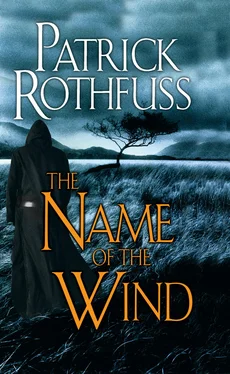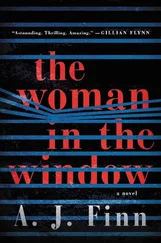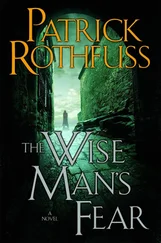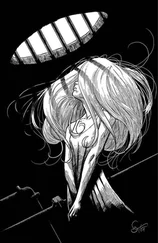“So in all likelihood there will be at least three women who have earned their talents?”
Stanchion nodded, watching me curiously.
“Well,” I said slowly. “If what everyone has told me is true, if only real excellence can win the pipes, then one of those women will know Aloine’s part.”
Stanchion took another long, slow drink, watching me over the top of his tankard. When he finally set it down he forgot to wipe his beard. “You’re a proud one, aren’t you?” he said frankly.
I looked around the room. “Isn’t this the Eolian? I had heard that this is where pride pays silver and plays golden.”
“I like that,” Stanchion said, almost to himself. “Plays golden.” He slammed his tankard down onto the bar, causing a small geyser of something frothy to erupt from the top. “Dammit boy, I hope you’re as good as you seem to think you are. I could use someone else around here with Illien’s fire.” He ran a hand through his own red hair to clarify his double meaning.
“I hope this place is as good as everyone seems to think it is,” I said earnestly. “I need a place to burn.”
“He didn’t throw you out,” Simmon quipped as I returned to the table. “So I’m guessing it didn’t go as badly as it could have.”
“I think it went well,” I said distractedly. “But I’m not sure.”
“How can you not know?” Simmon objected. “I saw him laugh. That must mean something good.”
“Not necessarily,” Wilem said.
“I’m trying to remember everything I said to him,” I admitted. “Sometimes my mouth just starts talking and it takes my mind a little bit to catch up.”
“This happens often, does it?” asked Wilem with one of his rare, quiet smiles.
Their banter began to relax me. “More and more often,” I confessed, grinning.
We drank and joked about small things, rumors of the masters and the rare female students who caught our attention. We talked about who we liked in the University, but more time was spent mulling over who we didn’t like, and why, and what we would do about it given the chance. Such is human nature.
So time passed and the Eolian slowly filled. Simmon gave in to Wilem’s taunting and began to drink scutten, a powerful black wine from the foothills of the Shalda mountains, more commonly called cut-tail.
Simmon showed the effects almost immediately, laughing louder, grinning wider, and fidgeting in his seat. Wilem remained his same taciturn self. I bought the next round of drinks, making it large mugs of straight cider for each of us. I responded to Wilem’s scowl by telling him that if I made my talent tonight, I would float him home in cut-tail, but if either of them got drunk on me before then, I would personally thrash them and drop them in the river. They settled down an appreciable amount, and began inventing obscene verses to “Tinker Tanner.”
I left them to it, retreating into my own thoughts. At the forefront of my mind was the fact that Stanchion’s unspoken advice might be worth listening to. I tried to think of other songs I could perform that were difficult enough to show my skill, but easy enough to allow me room for artistry.
Simmon’s voice drew me back to the here and now. “C’mon, you’re good at rhymes . . .” he urged me.
I replayed the last bit of their conversation that I’d been half listening to. “Try ‘in the Tehlin’s cassock,’ ” I suggested disinterestedly I was too nervous to bother explaining that one of my father’s vices had been his propensity for dirty limericks.
They chortled delightedly to themselves while I tried to come up with a different song to sing. I hadn’t had much luck when Wilem distracted me again.
“What!” I demanded angrily. Then I saw the flat look in Wilem’s eyes that he only gets when he sees something he really doesn’t like. “What?” I repeated, more reasonably this time.
“Someone we all know and love,” he said darkly, nodding in the direction of the door.
I couldn’t see anyone I recognized. The Eolian was nearly full, and over a hundred people milled about on the ground floor alone. I saw through the open door that night had settled outside.
“His back is to us. He’s working his oily charm on a lovely young lady who must not know him . . . to the right of the round gentleman in red.” Wilem directed my attention.
“Son of a bitch,” I said, too stunned for proper profanity.
“I’ve always figured him for porcine parentage myself,” Wilem said dryly.
Simmon looked around, blinking owlishly. “What? Who’s here?”
“Ambrose.”
“God’s balls,” Simmon said and hunched over the tabletop. “That’s all I need. Haven’t you two made nice yet?”
“I’m willing to leave him be,” I protested. “But every time he sees me he can’t help but make another jab in my direction.”
“It takes two to argue,” Simmon said.
“Like hell,” I retorted. “I don’t care whose son he is. I won’t go belly-up like some timid pup. If he’s fool enough to take a poke at me, I’ll snap the finger clean off that does the poking.” I took a breath to calm myself, and tried to sound rational. “Eventually, he’ll learn to leave me well enough alone.”
“You could just ignore him,” Simmon said, sounding surprisingly sober. “Just don’t rise to his baiting and he’ll tire of it soon enough.”
“No,” I said seriously, looking Simmon in the eye. “No, he won’t.” I liked Simmon, but he was terribly innocent at times. “Once he thinks I’m weak he’ll be on me twice as thick as the day before. I know his type.”
“Here he comes,” Wilem observed, looking casually away.
Ambrose saw me before he made it to our side of the room. Our eyes met, and it was obvious that he hadn’t expected to see me there. He said something to one of his ever-present group of bootlickers and they moved off through the crowd in a different direction to claim a table. His eyes moved from me, to Wilem, to Simmon, to my lute, and back to me. Then he turned and walked to the table his friends had claimed. He looked in my direction before he took his seat.
I found it unnerving that he didn’t smile. He had always smiled at me before, an over-sad pantomime smile, with mockery in his eyes.
Then I saw something that unnerved me even more. He was carrying a sturdy squared case. “Ambrose plays lyre?” I demanded of the world in general.
Wilem shrugged. Simmon looked uncomfortable. “I thought you knew,” he said weakly.
“You’ve seen him here before?” I asked. Sim nodded. “Did he play?”
“Recited, actually. Poetry. He recited and kind of plucked at the lyre.” Simmon looked like a rabbit about to run.
“Does he have his talent?” I said darkly. I decided then that if Ambrose was a member of this group, I didn’t want anything to do with it.
“No,” Simmon squeaked. “He tried for it, but . . .” He trailed off, looking a little wild around the eyes.
Wilem lay a hand on my arm and made a calming gesture. I took a deep breath, closed my eyes, and tried to relax.
Slowly, I realized that none of this mattered. At most, it simply raised the stakes for tonight. Ambrose wouldn’t be able to do anything to disrupt my playing. He would be forced to watch and listen. Listen to me playing “The Lay of Sir Savien Traliard,” because now there was no question as to what I would be performing tonight.
The evening’s entertainment was led by one of the talented musicians from the crowd. He had a lute and showed that he could play it as well as any Edema Ruh. His second song was even better, one that I’d never heard before.
There was a gap of about ten minutes before another talented musician was called onto the stage to sing. This man had a set of reed pipes and played them better than anyone I had ever heard. He followed by singing a haunting eulogy in a minor key. No instrument, just his high clear voice that rose and flowed like the pipes he had played before.
Читать дальше











